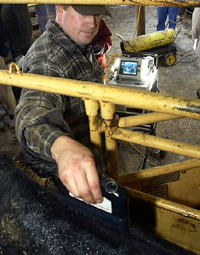Kentucky Bull Evaluation Program Sale Is March 25
Kentucky Bull Evaluation Program Sale Is March 25

Beef producers looking for a quality bull to add to their operation may find one at the 2003 Kentucky Bull Evaluation Program auction on March 25 in Muhlenberg County.
In order to participate in the program the bulls had to meet certain Expected Progeny Difference (EPD) and health requirements and in order to sell they must also pass a breeding soundness exam and a screening committee that is determining structural soundness and temperament.
The evaluation provides producers with an accumulation of data to aid them in choosing an animal.
“It is a high quality set of bulls with known information,” said Darrh Bullock, a beef specialist with the University of Kentucky Cooperative Extension Service. “Having this information is like having a bag of feed and having the ingredients and expected performance on the feed tag.”
The program is in its third year and is sponsored by the University of Kentucky Cooperative Extension Service, Kentucky Beef Improvement Association, Kentucky Cattlemen’s Association and the Kentucky Department of Agriculture. UK sponsored a bull evaluation program and sale for a number of years in central Kentucky but discontinued it in 1992. On-farm evaluations were conducted until three years ago when seedstock producers expressed an interest in resuming the centralized evaluation program and sale.
Seedstock producers consign bulls in the program. The animals are kept at a central feedlot in Daviess County where they are fed a corn silage, wheatlage based ration with corn and soybean meal supplemented to achieve appropriate gains. The feedlot is partially under shelter, on concrete with an open, dirt exercise area.
Initially, 29 senior and 58 junior bulls were placed on feed in late November, Bullock said. In general, the bulls are healthy and gaining at the desired rate.
Unlike many other evaluations, the bulls are being developed in a manner that will optimize their breeding potential, not to maximize gain. The gain averages for the senior bulls are 3.64 pounds per day and 3.59 pounds per day for the junior bulls.
Not all the bulls consigned into the program will make it through to the sale, Bullock said. Their consignors will withdraw some while others may not meet program requirements. Between 70 and 75 bulls are likely to make it to the auction, he said.
At the weigh-in the senior bulls were measured ultrasonically for carcass traits and that information will be used in the genetic evaluation for them. When the bulls are weighed-off junior bulls will be measured for their carcass traits. In order for the information to be useful it must be collected at approximately one year of age.
Feeding performance, EPDs for many traits, ultrasound information, scrotal circumferences and more information on each bull will be available at the sale.
The bulls will sell at the Muhlenberg County Ag Center in Central City on March 25, 2003 at 6:30 p.m. CT. If you would like more information on the Bull Evaluation Program or the sale please contact Darrh Bullock at 804 W.P. Garrigus Bldg., Lexington, KY 40546 or (859) 257-7514. He can be also reached via email at dbullock@uky.edu.
